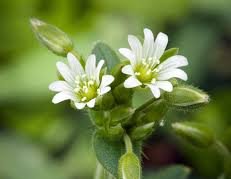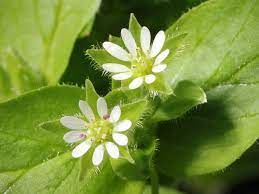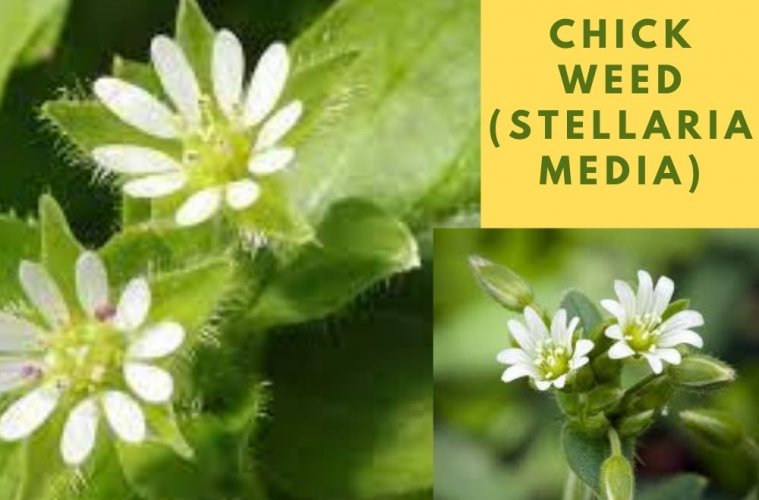Chickweed is a widespread weed that grows in lawns, gardens, and fields. It has been used for centuries as herbal medicine to treat various disorders. It contains many nutrients, including vitamin A, calcium, potassium, and beta-carotene.
The herb also has anti-inflammatory properties, which can help with conditions like arthritis or osteoporosis. If you are looking for a natural treatment option for these health problems, Chickweed (Stellaria media) could be your answer!
Contents
Synonym
CHICKWEED (Stellaria media), also known as common chickweed, starwort, winterweed, or craches.

Habitat
The plant can be found in the wild, growing close to swampy areas, riverbanks, gardens, lawns, and other damp places. It is found in lawns and other open areas throughout Europe, Asia, and North America.
CHICKWEED (Stellaria media) is a common plant growing on forest edges, along with sides and near watermills, which are often preserved as nesting sites for the expanding population of COMMON CHECKERSPOT butterflies that rely on Stellaria media.
Description
This perennial weed thrives off moisture and light, with its white flowers blooming throughout the summertime.
Chickweed can be identified by its small green leaves that grow close to one another on long petioles (stalks). The stems are often hairy or covered with large hairs/spines, which help them stand upright when waterlogged. The stem will also have many branches near ground level as well some higher up away from wet soil – this plant prefers drier areas for rooting!
The tiny white flower of chickweed has five petals around a yellow center that resemble the shape of an “egg,” hence the name “chickweed.”
 Part Used
Part Used
The entire plant is used medicinally, including the leaves and flowers
The leaves and stems are used to make tea.
A tincture is made from dried plant material, usually in alcohol or vinegar.
Traditional Uses and Benefits
Chickweed is both edible and medicinal, containing vitamins A, C & E. The leaves can be eaten raw or boiled for a few minutes to remove their sour taste. They are also used in salads and soups!
Research suggests that chickweed can reduce the severity of digestive problems such as gas, bloating, and diarrhea. Some people also use it to increase their appetite or weight loss goals.
If you’re feeling crummy and experience phlegm buildup, chickweed may be helpful. It’s a natural expectorant that promotes the expulsion of mucus and other unwanted substances from the lungs. This plant also has anti-inflammatory properties, so it can help to reduce asthma symptoms.
The plant is known for its soothing, cooling effect on inflamed tissues when applied externally as well. This makes chickweed an excellent choice for topical treatments like balms or lotions meant to relieve skin inflammation such as eczema and psoriasis. It will also help heal wounds faster thanks to its ability to promote cell growth and fight infection by inhibiting tumor necrosis factor-alpha (TNF).
The plant contains flavonoids with antioxidant properties and makes the herb able to heal wounds quickly by stimulating the growth of new cells and repairing damaged tissue. This makes Stellaria media an effective remedy against many types of skin diseases such as psoriasis and eczema caused by chronic inflammation; sores from cuts or burns; blisters on hands resulting from contact.
 Dosage and Precautions
Dosage and Precautions
Dose: One cup of chopped leaves per person three times a day.
Precautions: Stellaria Media is generally safe, but it may cause skin irritations and allergic reactions in some individuals. It is not recommended for people who are pregnant or breastfeeding. Careful attention should be paid to anyone with diabetes, as chickweed can affect blood sugar levels.
References
- Chickweed facts and health benefits. https://www.healthbenefitstimes.com/chickweed/
- Biology: Stellaria media – HandWiki. https://handwiki.org/wiki/Biology:Stellaria_media
- Chickweed: Benefits, Side Effects, and Preparations. https://www.verywellhealth.com/chickweed-what-should-i-know-about-it-89437
- Chickweed Uses, Benefits & Side Effects – Drugs.com Herbal …. https://www.drugs.com/npc/chickweed.html
- https://www.healthline.com/nutrition/chickweed-benefits#downsides
DISCLAIMER
The content and information on newerapost for information and educational purposes only. It is not for self-diagnosis and self-treatment. The content is not a medical manual. Before beginning the use of any prescription, medication and pursuing any self-treatment, all readers should consult a physician.
The information given in this article is intended to help you make informed decisions for your health. You must consult with your doctor before pursuing any natural remedies if you are under care for any health condition.
Do not take any vitamins, minerals, herbs, or other supplements without consulting your doctor, if you are taking any medication. The website does not make a representation, express or implied, regarding the accuracy of the information and does not accept any single responsibility for any errors or misuse.

